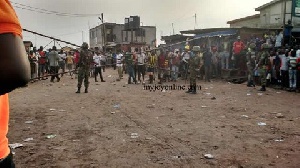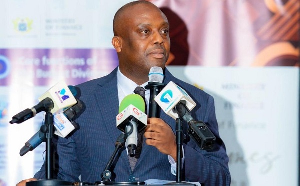The clashes that occurred at Agbogbloshie between Konkombas and Dagombas should be treated as an illegality, Yendi MP and Deputy Foreign Affairs Minister Mohammed Tijani has said.
He urged the general public, media, and police to delink politics from the development and look at it as a purely criminal matter.
Renewed clashes between the feuding factions at Old Fadama on Tuesday 11 April led to the loss of two lives with others sustaining various degrees of injury.
Government and some security heads, including the Inspector General of Police (IGP), have engaged both factions in a dialogue to foster peace.
Speaking on the development in an interview with Chief Jerry Forson, host of Ghana Yensom on Accra100.5FM on Thursday April 13, Mr Tijani said: “This should not be linked to politics. This should not be handled like Dagombas and Konkombas but it should be handled like a criminal issue because it is purely criminal.
“[If] all those who are involved will be dealt with, then the underlining factor is what we are going to engage them [on].”
Meanwhile former Deputy Foreign Affairs Minister, Emmanuel Bombande, is advocating special dialogue to foster peace between Dagombas and Konkombas at Agbogbloshie in Accra.
Speaking to Class News “What we should be doing right is to understand at a deeper level that this is a community in need of a human security approach much more than enforcing peace through the police. You want to be able to engage the communities by creating the space for dialogue that makes it possible for peaceful co-existence and tolerance to prevail. But that dialogue must be designed,” he stated.
“So what we need to do is to get the National Peace Council to sit down and have the kind of consultation that will design how the dialogue should be like. Though we say dialogue is important don’t just jump into it.
How should it be? Who should be part of it? What should be the agenda? Where do we see the dialogue going? And that is why it then comes along with the government’s role of investing in human security so that the reorganisation of that community and that neighbourhood is in itself reflective of the outcomes of the dialogue.”
General News of Thursday, 13 April 2017
Source: classfmonline.com













